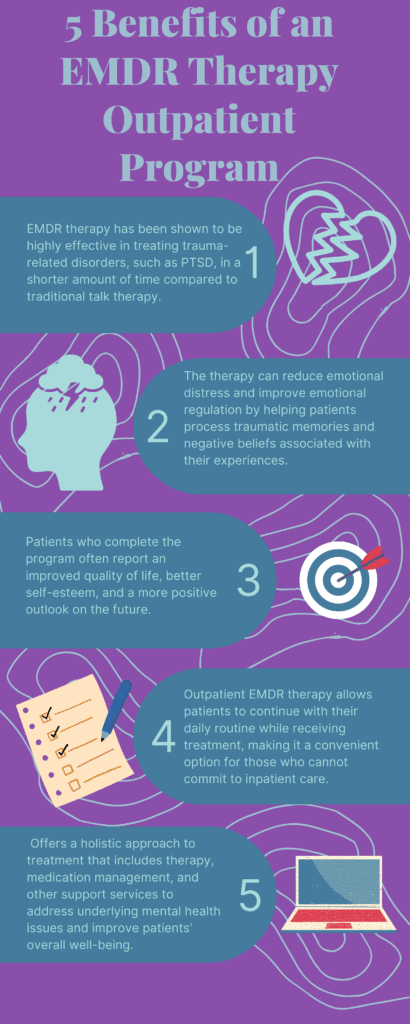What is an EMDR Therapy Outpatient Program?
An EMDR therapy outpatient program is a treatment option that provides intensive therapy sessions for individuals with trauma-related disorders. The program typically involves several sessions a week for a designated period, often a few months. The program’s goal is to provide patients with a supportive environment and specialized therapy. Addressing their symptoms and improving their overall mental health. Outpatient EMDR therapy allows patients to continue their daily routine while receiving treatment. Making it a convenient option for those who cannot commit to inpatient care. The program may also include other forms of therapy, such as cognitive-behavioral therapy, to complement the EMDR treatment.
What is EMDR Therapy?
EMDR (Eye Movement Desensitization and Reprocessing) is a psychotherapy technique that helps people process traumatic memories. The therapy involves recalling distressing experiences while focusing on external stimuli, such as hand movements or sounds, which can reduce the emotional intensity of the memory. EMDR has been shown to be effective for treating PTSD, anxiety, and other mental health conditions. It works by stimulating the brain’s natural ability to process information and integrate experiences. EMDR is typically conducted over a series of sessions and can be used in combination with other therapies.
What are the Benefits of an EMDR Therapy Outpatient Program?

The mental health benefits of an EMDR therapy outpatient program are significant. Trauma-related disorders, such as PTSD, can be treated effectively. Emotional distress is reduced, and emotional regulation and self-esteem are improved. Patients are better equipped to cope with stress and anxiety. Additionally, they develop new coping mechanisms to manage triggers and negative beliefs associated with their experiences. The therapy also helps patients process memories that have been holding them back, leading to an improved quality of life. Overall, the program takes a holistic approach to treatment, addressing underlying mental health issues, and improving overall well-being.
Effectiveness in treating trauma-related disorders: EMDR therapy has been shown to be highly effective in treating trauma-related disorders, such as PTSD, in a shorter amount of time compared to traditional talk therapy.
Reduced emotional distress: The therapy can reduce emotional distress and improve emotional regulation by helping patients process traumatic memories and negative beliefs associated with their experiences.
Improved quality of life: Patients who complete the program often report an improved quality of life, better self-esteem, and a more positive outlook on the future.
Convenient treatment: Outpatient EMDR therapy allows patients to continue with their daily routine while receiving treatment, making it a convenient option for those who cannot commit to inpatient care.
Holistic approach: EMDR therapy outpatient programs often offer a holistic approach to treatment that includes therapy, medication management, and other support services to address underlying mental health issues and improve patients’ overall well-being.
Who Would Benefit From an EMDR Outpatient Therapy Program?
An EMDR therapy outpatient program is beneficial for individuals who have experienced trauma, such as physical or sexual abuse, and are struggling with trauma-related disorders like PTSD. It can also help individuals who have difficulty regulating their emotions, experience anxiety, depression, or personality disorders. Those who have a dual diagnosis, which is a co-occurring substance abuse disorder and mental health condition, can also benefit from this program. People who want a convenient treatment option that allows them to continue their daily routine while receiving intensive therapy sessions can also benefit from the program. The program’s holistic approach addresses underlying mental health issues, leading to an improved quality of life.
Is an EMDR Therapy Outpatient Program Covered by Insurance?
Yes, in the United States, dual diagnosis treatment is typically covered by insurance, including private insurance. Medicaid, and Medicare are also covering this treatment. Under the Affordable Care Act (ACA), insurance plans are required to cover mental health and substance abuse treatment. They must cover the same level as other medical services. This means that individuals with co-occurring disorders have the right to access affordable, comprehensive care.
The level of coverage for dual diagnosis treatment may vary depending on the specific insurance plan. Most plans cover a range of services, including inpatient and outpatient treatment, medication management, and therapy. How to determine your insurance coverage for dual diagnosis treatment? It’s important to contact your insurance provider directly. You can work with the treatment program’s staff to verify your insurance benefits and coverage.
It’s important to note that while insurance can help cover the cost of dual diagnosis treatment, there may still be out-of-pocket costs. This includes copays or deductibles. Some treatment programs may also offer financial assistance. Sliding scale fees for individuals who cannot afford to pay the full cost of treatment are available.
For a completely confidential, free, and expert consultation give Resilience Behavioral Health a call today at (888)-401-1179 and speak with a treatment placement specialist.

